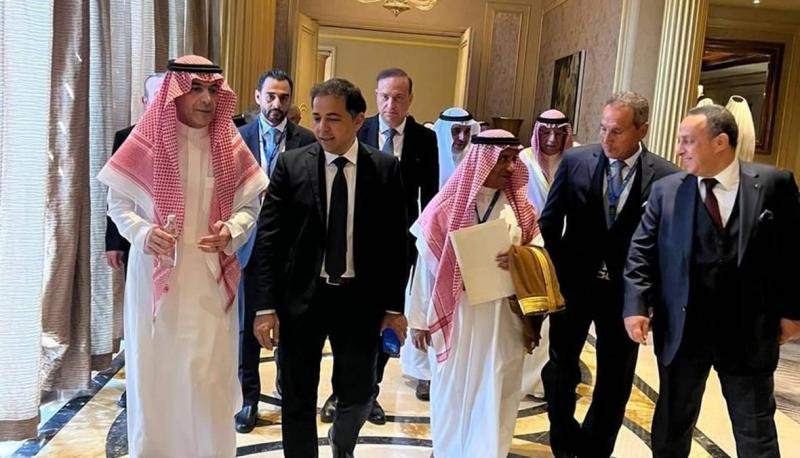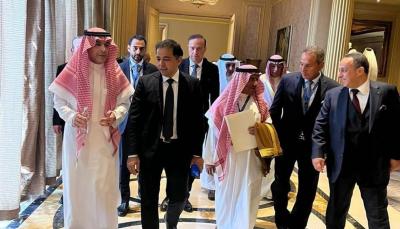The acting Governor of the Central Bank of Lebanon, Wassim Mansouri, has held promising talks in the Kingdom of Saudi Arabia, especially with the Governor of the Saudi Central Bank. It was learned that Mansouri's meeting with the Saudi Central Bank Governor involved a Lebanese request for Saudi support and the activation of joint financial investments. While both sides declined to discuss details, the results of Mansouri's visit to the Kingdom are expected to become clear in the coming weeks, especially since positivity was evident in his meetings with officials from the Arab Monetary Fund and Arab bank governors, who expressed interest in the trajectory of the banking and financial situation in Lebanon.
Special sources expect visits to Lebanon in the coming weeks, as well as preliminary agreements for holding financial conferences in Beirut that would support the Lebanese Central Bank in its efforts to restore internal and Arab trust in the Lebanese financial trajectory, which has been suffering a severe crisis for years and needs revitalization that begins with the approval of reform laws.
Mansouri had clarified that the return of funds to depositors is not impossible, indicating that "depositors should not have to wait any longer." He called for the expedited approval of the bank restructuring law after reevaluating their conditions to regain trust in the banking sector. He revealed that "the size of the Lebanese economy has shrunk from about $55 billion to around $20 billion," stating that "the crisis can only be resolved through much integration among technical, legal, and political entities."
Mansouri announced that the Central Bank intends to provide a new trading platform through "Bloomberg," which will facilitate converting Lebanese pounds to dollars. He confirmed in response to a question that Saudi Arabia always plays a positive role in resolving the Lebanese financial crisis, but he emphasized that the essence of the solution lies within Lebanon itself. Lebanon must complete its reform projects as soon as possible.
Mansouri participated in the "Union of Arab Banks" conference, which opened yesterday in Riyadh. The "Union of Arab Banks" signed an agreement to establish a regional office in the Kingdom, which coincides with the start of its operations in Riyadh. The Governor of the Saudi Central Bank, Ayman bin Mohammed Al-Sayari, stated on the sidelines of the Union meetings in Riyadh that "the banking system in the Kingdom enjoys solid performance indicators, as all precautionary ratios exceed the limits specified in Basel requirements, with a liquidity coverage ratio of 188.3 percent, while the net stable funding ratio reached 115 percent, and the capital adequacy ratio stood at 20.1 percent by the end of the second quarter of this year."
He added that "despite global economic challenges, the Saudi economy grew at a rate of 8.7 percent in 2022, and non-oil activity continued to grow at remarkable rates in the first half of this year, driven by structural reforms through the Kingdom's Vision 2030 programs." He clarified that local banks have expanded their financing activities to meet the ongoing demand for banking credit while maintaining moderate risk results, reflecting the robustness of the local economy. Many central banks have adopted tight monetary policies to curb the continuous rise in prices amid ongoing economic developments and global geopolitical repercussions and uncertainty.
He noted that "under the Saudi Central Bank's (SAMA) efforts to enable innovative technologies, it issued a regulatory framework for open banking, followed by the launch of the open banking laboratory, which is one of the main technological enablers for the open banking ecosystem in the Kingdom." He revealed that "SAMA has the appropriate tools to address potential challenges and continues to monitor local and global developments to maintain the stability and strength of the financial system." He indicated that "under the Financial Sector Development Program, SAMA is working with the Capital Market Authority on a program for emerging Saudi fintech companies by providing a range of enabling measures to support this promising sector."
Mansouri is scheduled to return to Beirut next Thursday to implement the decisions made in the Kingdom.
Also, the Ministry of Finance has completed all the amendments approved by the Cabinet on the draft budget law for 2023 and has sent the final version of the draft law to the General Secretariat of the Presidency of the Council of Ministers, which will refer it to the Parliament for discussion and approval. While the Cabinet meeting scheduled for this week has been postponed to Thursday to begin studying the draft budget for 2024, the Finance and Budget Committee, chaired by MP Ibrahim Kanaan and attended by Finance Minister Youssef Khalil, convened to follow up on developments regarding the proposed law framework to restore balance to financial regulation in Lebanon and the proposed law aimed at addressing the conditions of banks in Lebanon. Kanaan stated after the meeting: "We will not sign a blank check for the government, and we will not burden our conscience by approving a framework law that does not guarantee addressing the financial gap and repaying deposits to the people." He added: "Send us the audits of the banks' accounts and their assets to verify what they have and why this has not happened until now. We have no trust in state accounts or banks after the collapse unless there is neutral auditing."




